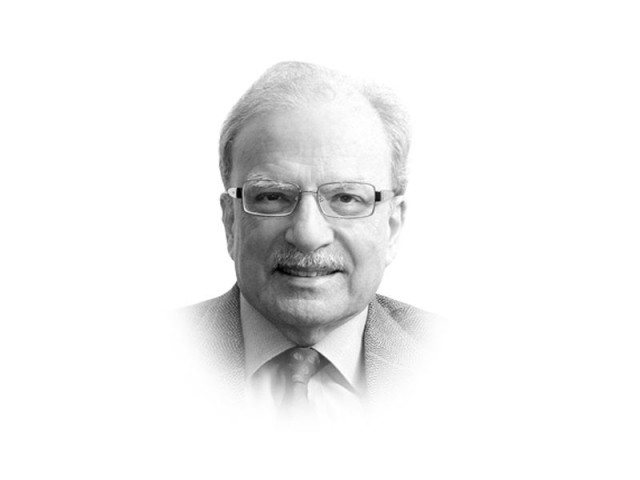PM Imran Khan’s maiden trip to China
Pakistan suffered from sharp increases in the fiscal and balance-of-payments gaps

The writer is a former caretaker finance minister and served as vice-president of the World Bank
The two-gap model became the framework within which bilateral aid agencies and multilateral development banks formulated their economic assistance programmes. It also provided the basis on which rich countries promised to provide 0.75 per cent of their GDP to poor nations. Chenery was invited by Robert McNamara to join him when the latter in 1968 was appointed by the United States to head the World Bank. For several years, Chenery served as the World Bank’s chief economist.
However, Imran Khan upon taking office had to deal with not two but three gaps. The third was the wide gap between the aspirations of the country’s youth and the ability of those who governed to satisfy them. While his ‘first 100 days’ programme was focused on meeting some of what his constituency of the youth in the urban areas expected of him, he chose to focus a great deal of his attention and energy on solving the problem created by the balance-of-payments gap. Some of this had begun to be corrected by the sharp decline in the value of the rupee. That this was allowed to happen was reversal of the policy adopted by the Pakistan Muslim League- Nawaz government that had held office for five years, from 2013 to 2018. Ishaq Dar, the then administration’s finance minister, believed in keeping the rupee strong. That had resulted in Pakistan losing ground in such traditional exports as textiles and leather products. The large Pakistani diaspora was also holding back on sending remittances to the country of their origin. On top of this, the State Bank of Pakistan was using its foreign currency reserves to keep the rupee strong. This was being done by selling dollars to buy rupees. Consequently, there was a significant decline in the amount of official foreign exchange reserves. By the time Imran Khan took office, the reserves had declined to less than $8 billion, equivalent to two months of imports. The reserve level had fallen below that needed for the country to be creditworthy for borrowing from the IBRD widow of the World Bank.
There was a great deal of commentary in domestic media — inevitably picked up by the foreign press — suggesting that Pakistan was heading towards a major financial crisis. It was this widely held perception that had the economic leaders of Pakistan to ask for help from the International Monetary Fund. The new finance minister met with the Fund managing director at the Bank-Fund annual meetings held this time in Bali, Indonesia. She indicated that a team would be sent to Pakistan to develop a programme of reform which, if acceptable to the Islamabad authorities, would result in the 13th Fund operation in the country. This raises an obvious question: would the Imran Khan administration be able to reconcile the Fund’s policy demands with what the main components of the PTI constituency expect from the new government?
Prime Minister Imran Khan seems to have been persuaded that his first priority should be to feed new financial resources into the coffers of the central bank rather than give his entire attention to satisfying the needs of his constituents. He travelled three times out of Pakistan during his first three months in office. There were two visits to Saudi Arabia — one of which included a side trip to the UAE — and one to China. The visit to Riyadh yielded a promise by the Saudi authorities to provide $6 billion worth of relief to Pakistan. One half of this was to be in the form of a short-term deposit in the State Bank of Pakistan and the remaining to finance import of Saudi oil on concessional terms. The kingdom also indicated interest in building a large oil refinery in the port city of Gwadar. There was some talk of Saudi Arabia becoming a partner in the China-Pakistan Economic Corridor initiative.
The premier travelled to China for a four-day visit at a time when several influential voices in Pakistan had indicated that his presence was needed in the country, as a three-day protest broke following Aasia Bibi’s acquittal. Many in the country believed this had to be handled with firmness and needed the full attention of the prime minister. But Imran Khan decided to go to Beijing and Shanghai to further develop the already strong relationship with China. However, the expectation that Khan would return with a package of support from Beijing was not realised. There was considerable misunderstanding in the country about what the Khan team had accomplished in their talks with China’s senior leaders.
The prime minister succeeded in placing Pakistan-China relations within a longer-term framework of association rather than the provision of short-term financial relief many in Pakistan expected. Developing an institutional basis for formulating the basis of long-term economic relationship is much more important than having Beijing deposit a large amount in the State Bank of Pakistan.
Published in The Express Tribune, November 12th, 2018.
Like Opinion & Editorial on Facebook, follow @ETOpEd on Twitter to receive all updates on all our daily pieces.












1724319076-0/Untitled-design-(5)1724319076-0-208x130.webp)


COMMENTS
Comments are moderated and generally will be posted if they are on-topic and not abusive.
For more information, please see our Comments FAQ